2024 Frontline Mental Health Conference
March 4th & 5th, 2024
JW Marriott Gold Coast Resort & Spa, QLD
The Frontline Sector; Uniting to Make Mental Health & Wellbeing a Priority.
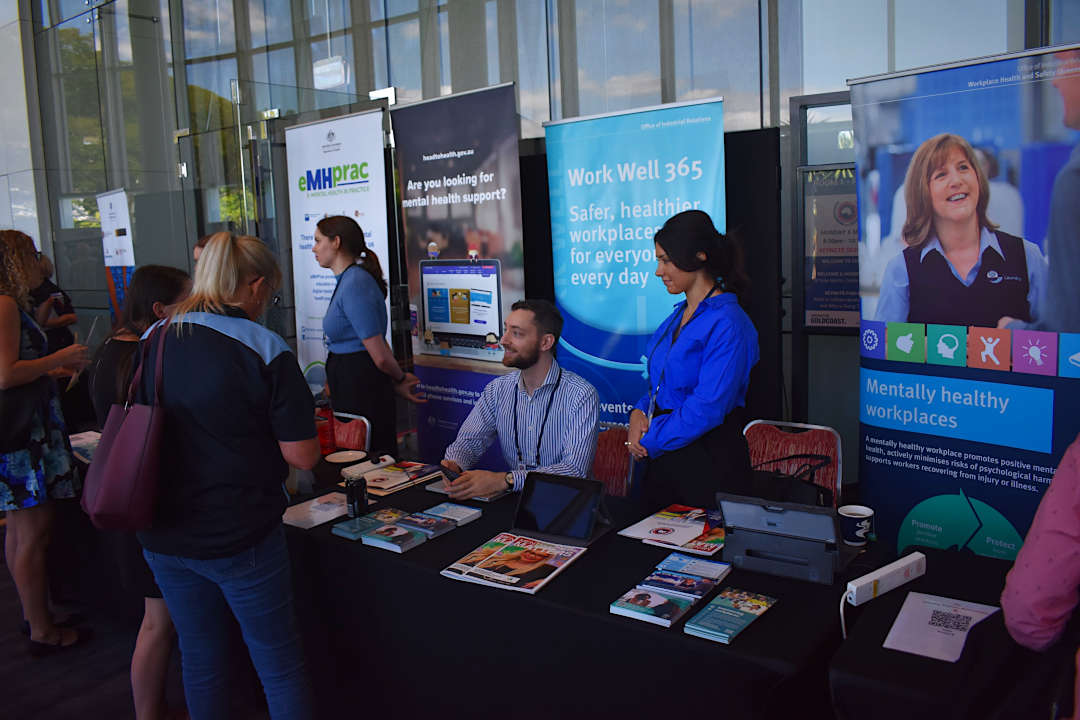
PARTNER
Partner with FMHC24
Connect with over 250 frontline workers and sector professionals before, during and after the conference.
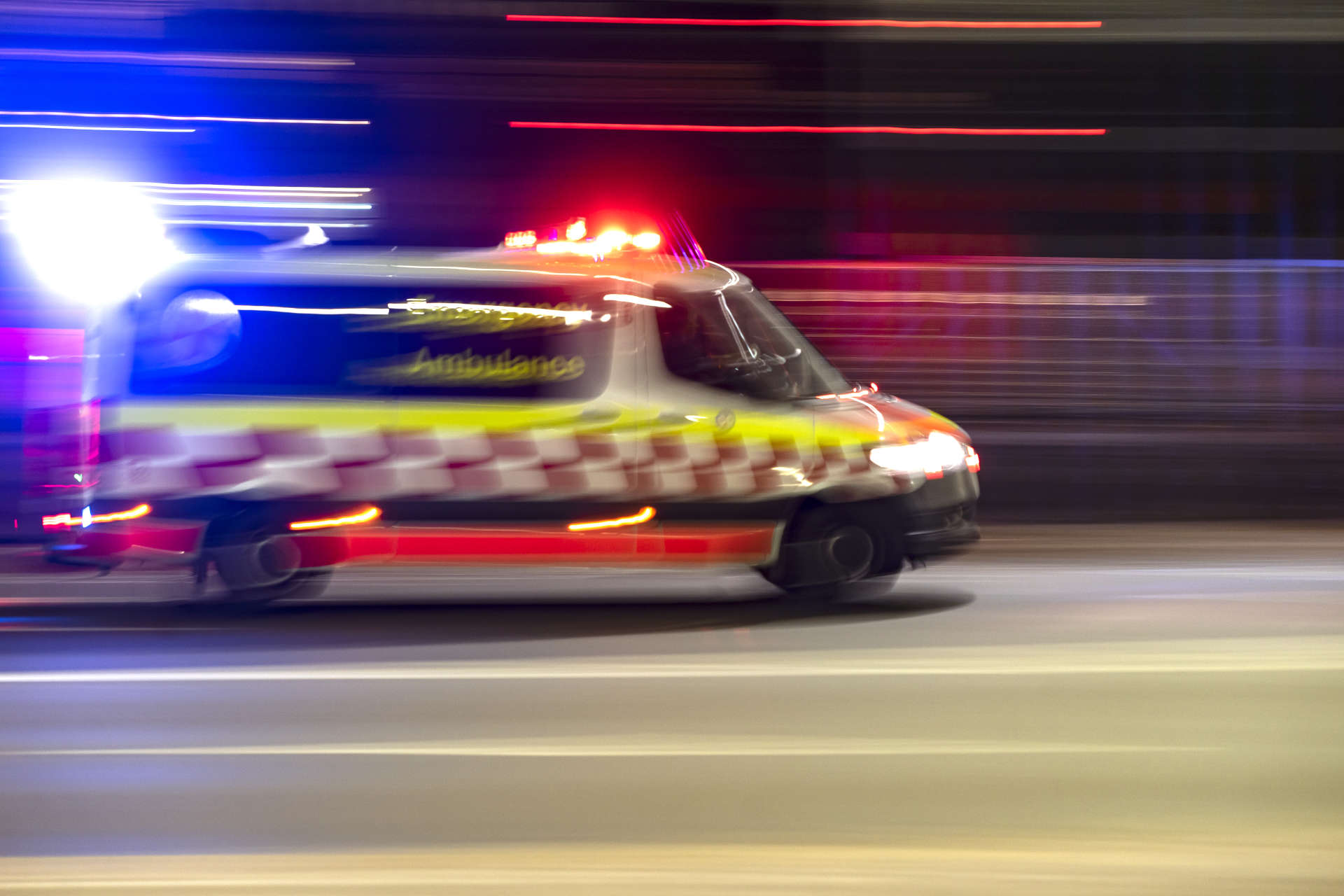
It’s time to do things differently.
You know it, your leaders know it, the sector knows it.
We must collaborate to unlock the power of mentally healthy habits within the frontline sector.
Join us at the Frontline Mental Health Conference and unite to cultivate a mentally resilient workforce.
Together, we can shape a frontline sector that thrives.
Troubling Statistics
1 Every Week
More than one veteran dying by suicide each week.
21
From the the Australian National Police and Emergency Services Mental Health and Wellbeing Study, it was determined that 21% had high and 9% had very high psychological distress.
11%
11% of Australian emergency workers have PTSD, compared to 4% of the general population.
89%
Accessing mental health expertise was considered difficult by 89% of New Zealand police and 62% of ambulance staff.
Sources: 1. aihw.gov.au | 2. nih.gov.au | 3. eshealth.com.au | 4. wiley.com
Frontline workers are heroes of our community with specific and special requirements when it comes to psychological safety, seeking help when it’s needed and challenging systemic stigma, harassment and bullying.
At the Frontline Mental Health Conference you will discover research, innovations and treatment techniques from mental health experts, meet with fellow sector workers, hear from sector leaders and unite to improve the mental health care and wellbeing of first responders - during training, whilst serving and in post-service.
Let’s work together to minimise psychological hazards, tackle burnout and PTSD and release the stigma around asking for help.
A frontline sector which promotes mentally healthy habits = a mentally healthy frontline workforce.
Image credit: Fire Rescue Victoria
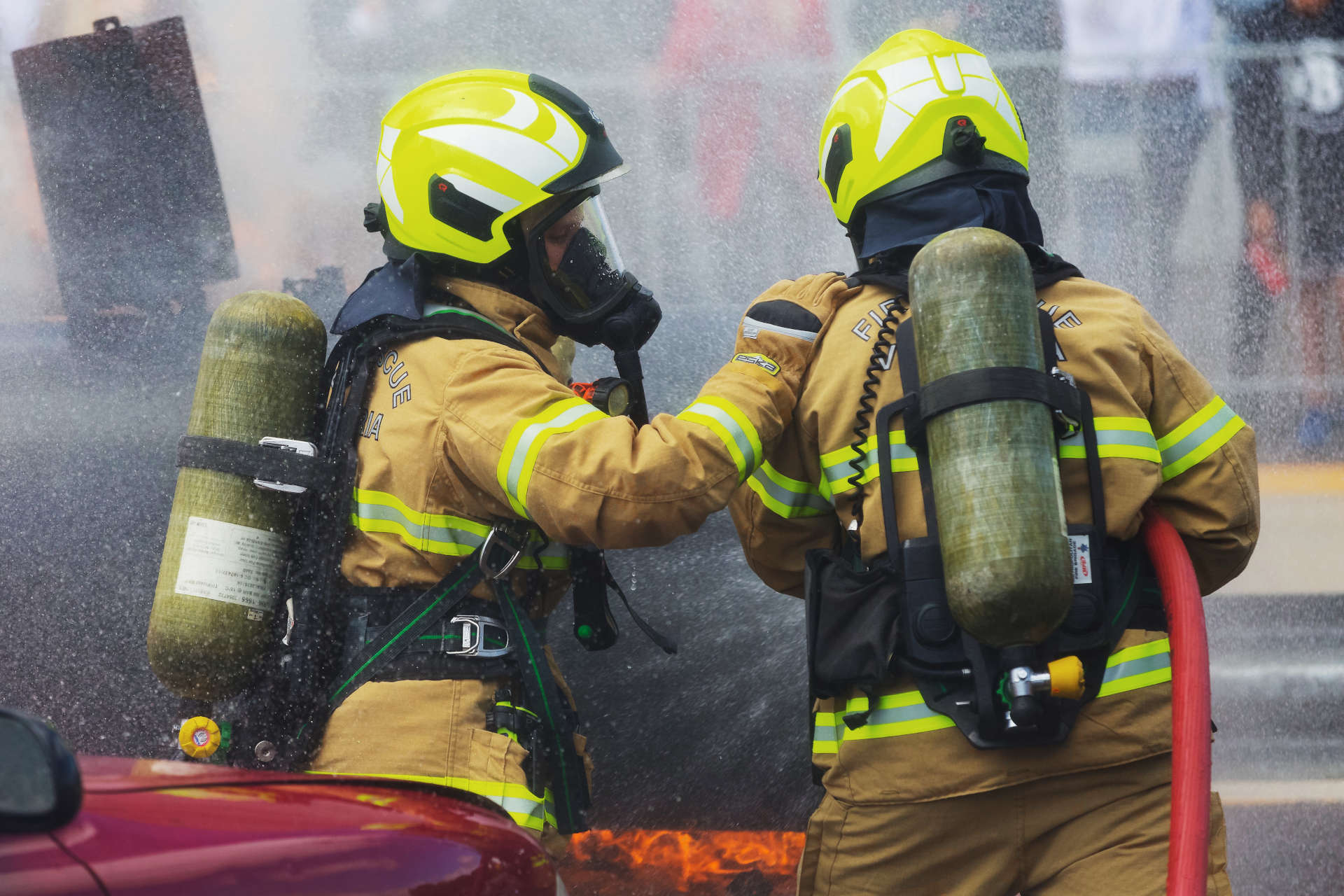
What will I learn at FMHC?
In 2024, our conference theme:
The Power of Collaboration: Working Together to Create Lasting Change
We will explore the topics:
- Combatting Empathic distress fatigue (compassion fatigue) and cultivating healthy empathy
- Nurturing Resilience: Promoting Mental Health and Building Coping Skills
- Navigating Vicarious Trauma and Embracing Post Traumatic Growth: Moving from darkness to thriving.
- Fostering Compassionate Communities: Creating Safe and Inclusive Cultural
- Tech-Enabled Wellness: Supporting and Empowering Mental Health through Technology
- Promoting Wellbeing: Integrating Risk Assessment, Work Health, Mitigation, Health and Safety Disciplines
- Holistic Wellbeing: Exploring the Interplay of Nutrition, Sleep, and Mental Health
- From Theory to Practice: Implementing Effective Strategies
- Empowering Voices, Embracing Change: Co-creating New Knowledge and Collaboration for Frontline Mental Health Transformation
- Preserving the flame: Preventing burnout and empathic distress fatigue
- Navigating Workplace Challenges: Fostering Supportive Environments
- Crisis Care: Effective Procedures and Compassionate Approaches during crisis situations
- Thriving Beyond Trauma: Supporting Successful Return to Work with Mental Health Injuries (PTSD etc)
- Empowering Frontline Champions: Creating Healthy Workplaces and Inclusive Environments for Lived Experience, Peer Workers, and Volunteers
- Healing the Invisible Wounds: Addressing Moral Injury
- Caring for Our Caregivers: Navigating the Challenges and Supporting the Families of Frontline Workers
- Breaking Barriers: Empowering Frontline Workers, Families, and Challenging Mental Health Stigma
- Lifecycle of frontline workers from recruitment, employment, training, transitions, retirement and beyond
- Psychosocial Risk and the implementation of processes within organisation
- Responding to Tragedy: Addressing Critical Incidents, the Impact of Line-of-Duty Deaths and Deaths by Suicide
- Shaping the Future: Student Engagement and Equipping Entry-Level Professionals
- Healing from Within: Trauma-Informed Approaches to Response, Intervention, and Practices
- Collective Guardianship: Uniting for Suicide Prevention
- Prioritising the Protectors: Supporting First Responders and Nurturing Support Systems
- Community Strength: The Vital Role of Family and Support Networks in First Nations Communities - Collaborative Approaches
- Creating Safe Spaces: Promoting Inclusion, Safety, and Belonging for LGBTQIA+, People with Disabilities, and Other Marginalised Communities
- Words Matter: Exploring Language and Ethical Communication
- Charting New Territories: Exploring Recent Work Health and Safety Legislation Changes in NSW and Queensland
- Setting the Bar: National Standards for Mental Health Training and Innovative Care Models
- Rights Empowerment: Ensuring Legal Rights and Accountability in Frontline Mental Health Services and Employment
Keynote Speakers
Associate Professor Jacqueline Drew
School of Criminology and Criminal Justice and Griffith Criminology Institute, Griffith University
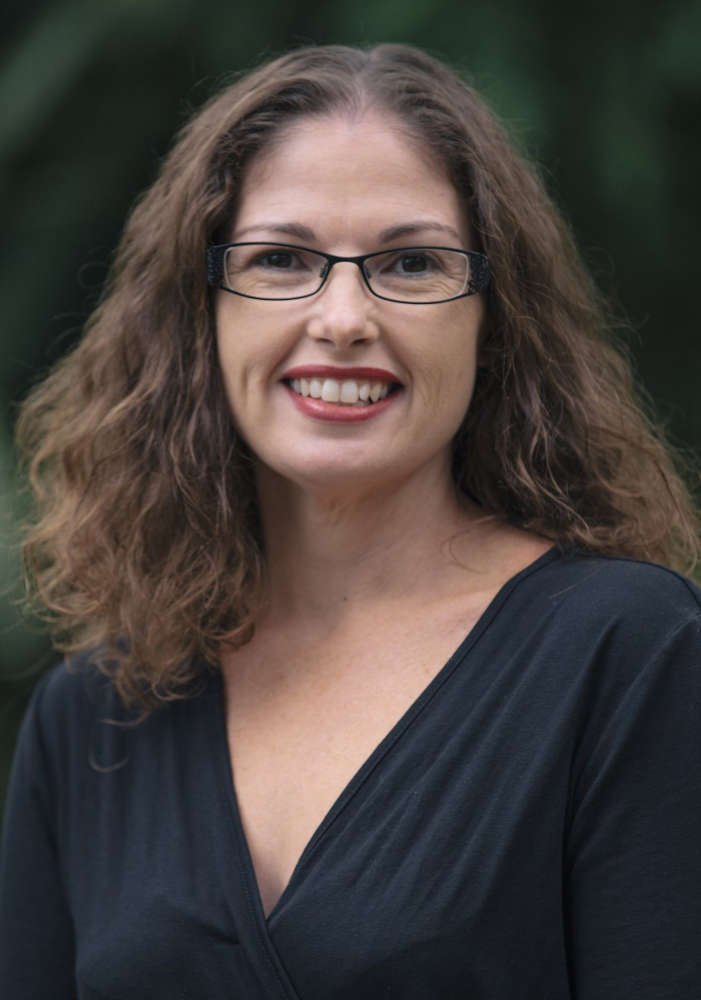
Associate Professor Jacqueline Drew
School of Criminology and Criminal Justice and Griffith Criminology Institute, Griffith UniversityDr Jacqueline Drew is an Associate Professor with the School of Criminology and Criminal Justice and Griffith Criminology Institute, Griffith University. Jacki has over 20 years of experience in law enforcement, as a practitioner and researcher. Jacki began her career in law enforcement with the Queensland Police Service (QPS). Jacki’s work focuses on police organisational practice and experiences of police personnel, specifically the areas of police mental health, suicide, police leadership, career paths of women police and recruitment and retention. Jacki has been awarded an Australian Research Council (Linkage) Grant, working with the Queensland Police Commissioner, to develop a workplace health and wellbeing early warning system to improve the mental health and wellbeing of police personnel. Jacki works internationally with law enforcement in the United States (US), she is a lead investigator on a national (US) biennial survey research program with the National Fraternal Order of Police focused on police wellbeing.
Professor Zachary Steel
St John of God Chair of Trauma and Mental Health
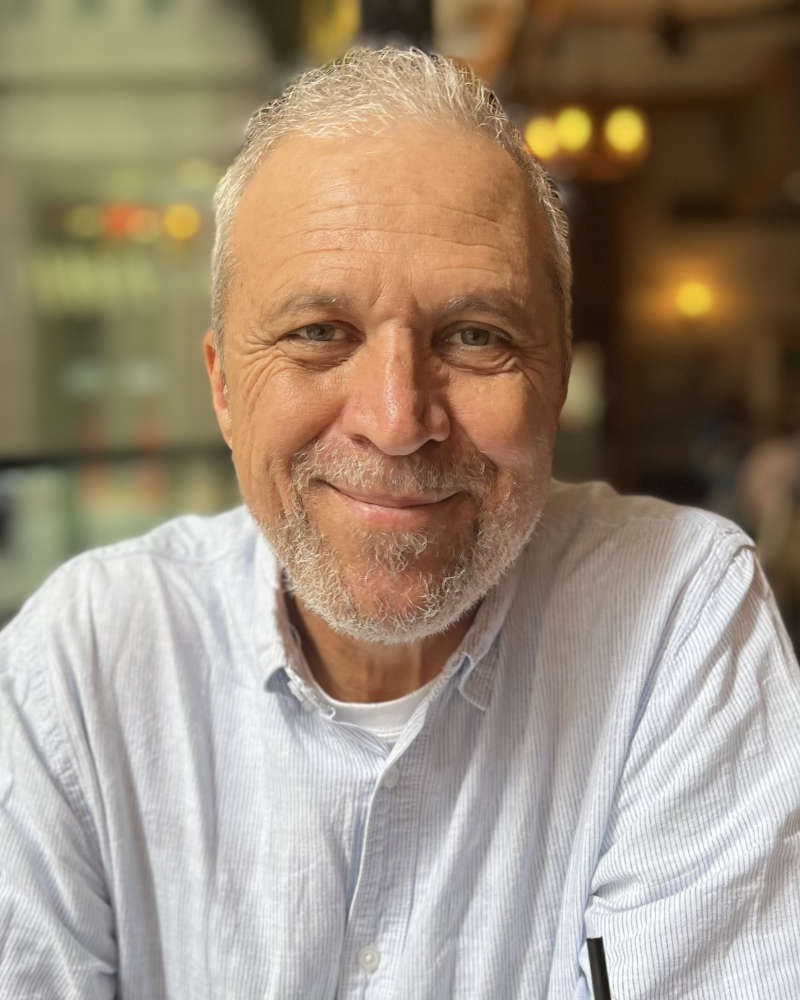
Professor Zachary Steel
St John of God Chair of Trauma and Mental HealthProfessor Zachary Steel holds the St John of God Chair of Trauma and Mental Health, a partnership between Richmond and Burwood Hospital in NSW and the Discipline of Psychiatry & Mental Health at University of New South Wales. He has more than 30 years’ experience as a researcher and clinician with a focus on the impact of trauma on veterans, first responders, frontline workers, refugees, asylum seekers, and civilian populations. He is also the immediate past president of the Australasian Society for Traumatic Stress Studies (2019-2021) and is on the Board for the Service for the Treatment and Rehabilitation of Torture and Trauma Survivors (STARTTS).
Dr Nikki Jamieson
Suicide Prevention Specialist and Founder, Moral Injury Australia

Dr Nikki Jamieson
Suicide Prevention Specialist and Founder, Moral Injury AustraliaDr Nikki Jamieson is a suicidologist, author, researcher and AASW registered social worker in Australia. Nikki’s interest in military suicide and moral injury, was born from lived experience and has led to pioneering research on moral injury and suicide, several publications, a book and national and international keynotes and workshops.
Nikki is an established leader in suicide prevention and moral injury, and has worked strategically within suicide prevention across a range of government departments including DVA, Health, Education and more recently for the Department of Defence where she currently holds a key role in suicide prevention.
CAPT Malcolm Roberts
Department of Defence
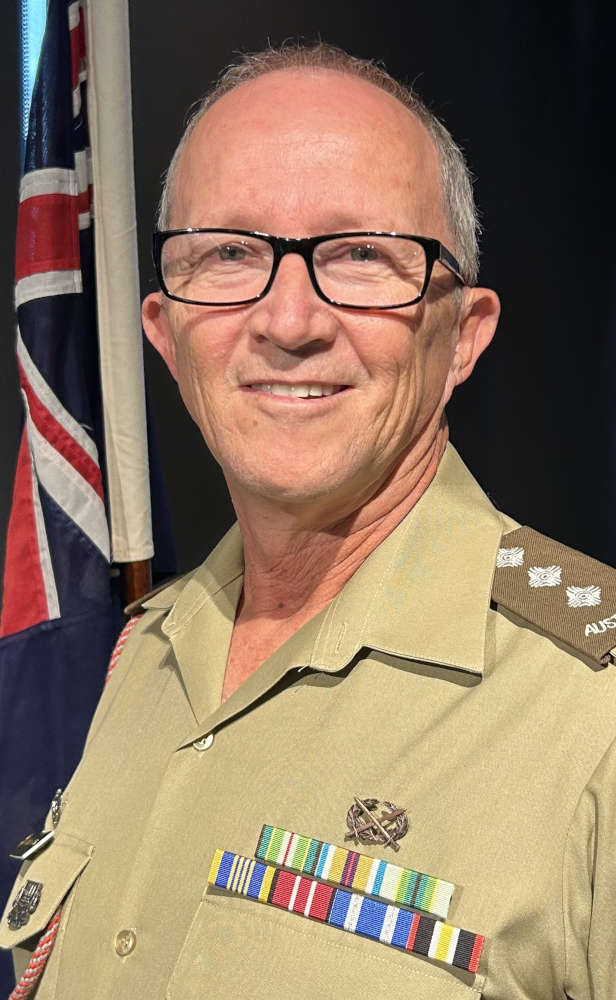
CAPT Malcolm Roberts
Department of DefenceCAPT Malcolm Roberts is in his 20th year in the Australian Army. In 2009/10 he deployed to Afghanistan on Operation Slipper as a company medic. It was during this deployment that he encountered a number of traumatic incidents including the death of a fellow soldier. CAPT Roberts continued his career in Army and in 2013 he completed his Bachelor of Nursing, commissioning as a Nursing Officer. It wasn’t until 10 years after his deployment that CAPT Roberts was diagnosed with PTSD. Since then he has had to navigate the challenges of maintaining a fulltime career in Defence with his recovery.
CAPT Roberts is a firm believer in the benefits of Lived Experience and finding purpose as a way of navigating the challenges of PTSD. He continues to deliver his Lived Experience talks to Defence members and advocates for destigmatising Mental Health in Defence and the wider community. CAPT Roberts is posted to HQ 2nd Health Brigade as the Long Term Schooling Manager for SE Qld, NSW & ACT. He is married to his ever patient wife Rachael and between them have four amazing children.
Professor Richard Bryant AC
Director, Traumatic Stress Clinic | Scientia Professor & NHMRC Leadership Fellow, School of Psychology, University of New South Wales
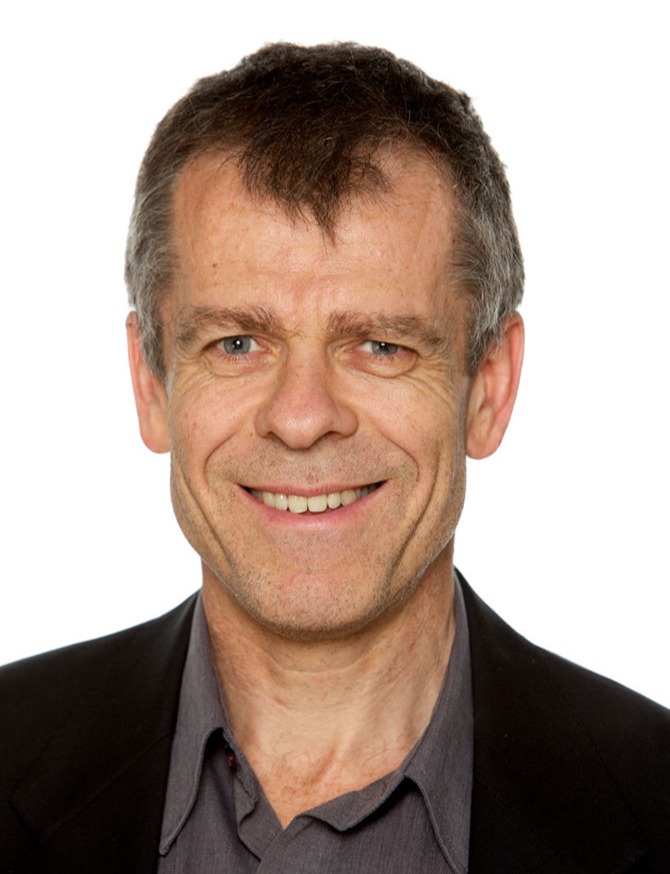
Professor Richard Bryant AC
Director, Traumatic Stress Clinic | Scientia Professor & NHMRC Leadership Fellow, School of Psychology, University of New South WalesRichard Bryant is a Scientia Professor of Psychology at the University of New South Wales, Sydney and Director of the Traumatic Stress Clinic. Professor Bryant’s research has focused on the nature and treatment of stress reactions. He has identified key genetic, neural, and psychological factors underpinning stress reactions and strategies to manage them. His assessment and treatment protocols have been translated into over 15 languages and used in many countries. Professor Bryant has written 6 books, 87 book chapters, and 760 journal articles. He has worked with many first responder agencies in managing traumatic stress, as well as working with the World Health Organization to develop programs to manage stress reactions in countries affected by trauma and adversity. He also served on panels to develop traumatic stress diagnoses for ICD-11 and DSM-5.
Chaplain Rob Sutherland CSC
Principal Veterans’ Chaplain, Department of Veterans’ Affairs
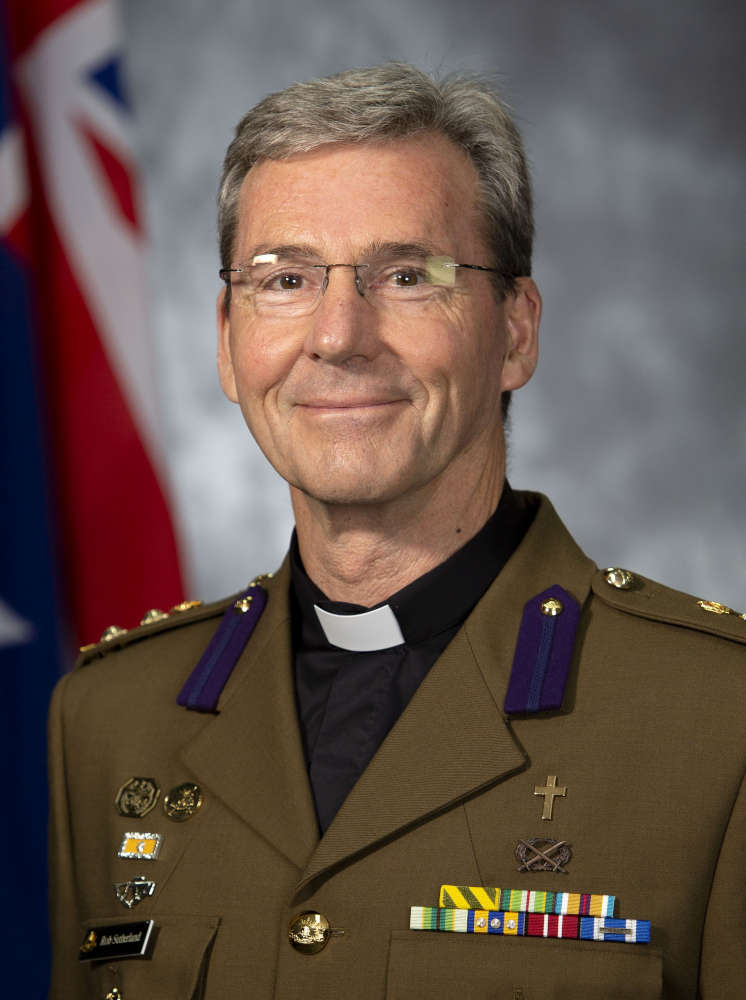
Chaplain Rob Sutherland CSC
Principal Veterans’ Chaplain, Department of Veterans’ AffairsChaplain Rob Sutherland, CSC, BTh, MMin is the Principal Veterans Chaplain in the Department of Veterans Affairs (DVA).
As an Infantry Officer, Rob studied theology and was ordained an Anglican priest. He has been part-time and full-time Army chaplain since 1998.
Rob has deployed overseas on operations as a chaplain seven times, mainly with Special Operations Task Groups. Seeing the effects of combat and operations on soldiers, Rob looked for recovery and healing options for veterans.
Rob has been to the US and Canada (including a Churchill Fellowship) studying programs for recovery. He has developed or worked on numerous Moral Injury, spiritual wounds, suicide prevention, mental health and resilience programs. He has contributed to books and numerous articles and presentations on healing for veterans and families.
Rob has been a prison chaplain (Goulburn CC) and Parish priest and is Director of Warrior Welcome Home, a faith-based recovery program for Moral Injury and spiritual wounds.
He wrote the 2021 Report into the need for Pastoral Support, Spiritual Health and Chaplaincy Effects for Former Serving Members and Families. He is seconded to DVA as Principal Veterans Chaplain leading the Veterans Chaplaincy Pilot Program.
Tara Lal
Senior Firefighter and Peer Supporter, Fire & Rescue NSW
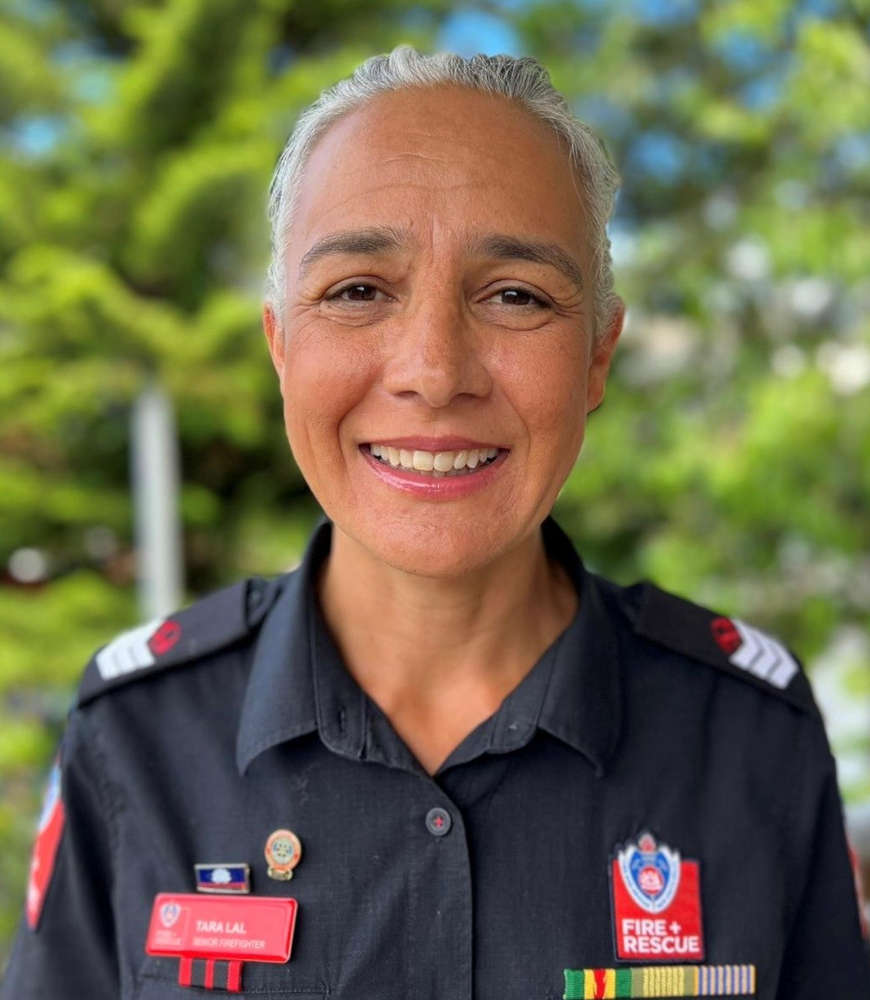
Tara Lal
Senior Firefighter and Peer Supporter, Fire & Rescue NSWTara is a professional firefighter and peer support officer with Fire and Rescue NSW. She is also a PhD candidate at the University of New England and was awarded the inaugural Australian Rotary Health scholarship for research into the mental health of emergency service workers in 2018. Her research focusses on understanding the impact of suicide on firefighters. She is also the internationally published author of Standing on My Brother’s Shoulders – Making peace with Grief and Suicide. Tara is a Mental Health First Aid instructor and has managed the psychological wellbeing program in Fire and Rescue NSW working with researchers at the Black Dog Institute to implement programs aimed at building resilience and improving mental health outcomes in firefighters. She was a finalist in the Rotary Inspirational Woman of the Year awards in 2017 and was awarded the Australian Fire Service Medal in 2022 for her work supporting the mental health of firefighters. In March 2021 Tara cycled 5000km unsupported from the western most point to the eastern most point of Australia raising over $21k for Lifeline and awareness for two organisations for which is an ambassador - Fortem Australia and StandBy Support After Suicide. Her mission is to use the voice of lived experience in her research to effect meaningful change at individual, organisational and community level.
Derrick McManus
Speaker, Facilitator, Author, Human Durability
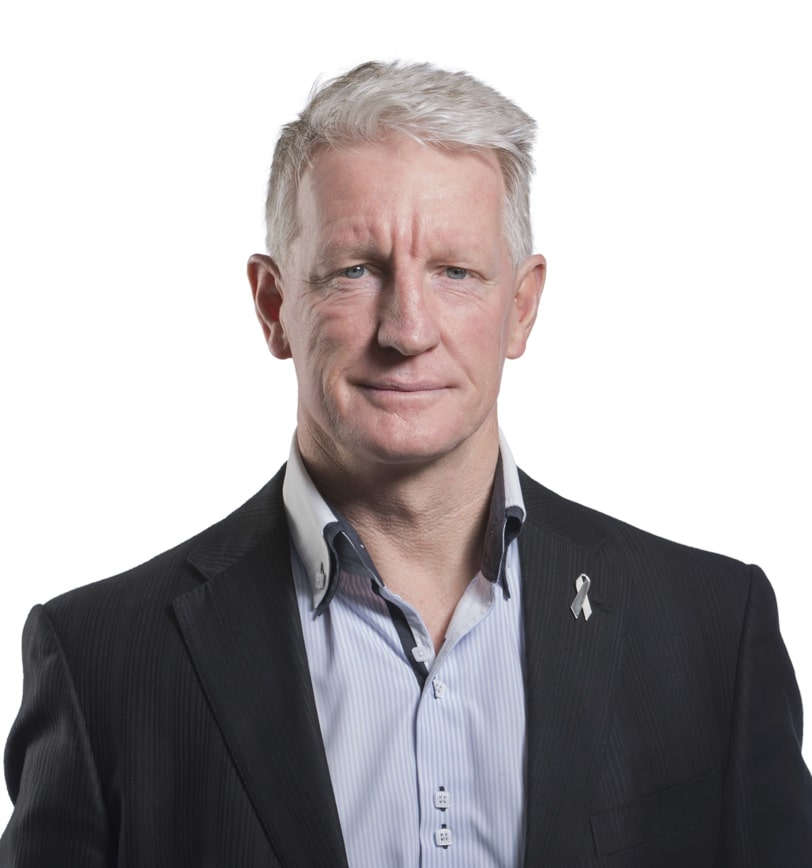
Derrick McManus
Speaker, Facilitator, Author, Human DurabilityDerrick McManus was a Sniper, Tactical Diver and trained by the military elite SAS (Special Air Service) as a Counter-Terrorist Operative in the SA Police STAR Group (Special Tasks And Rescue Group). As you would well imagine, his work required 100% effort and Peak Performance.
Now, after an extreme workplace injury, Derrick has experienced Post-Traumatic Growth, is an international speaker and facilitator and founded The Australian Centre for Human Durability - The Ability to Go Beyond Resilience to Sustainable Optimal Performance.
Through lived experience, he has distilled a mental well-being methodology that allows Frontline Operators to also experience Post-Traumatic Growth from their service.
He has worked with police, the Army and the RAAF including fighter pilots with great success. His methodologies apply equally to the general public too.
James Hill
Mental Health Manager, Energy Queensland
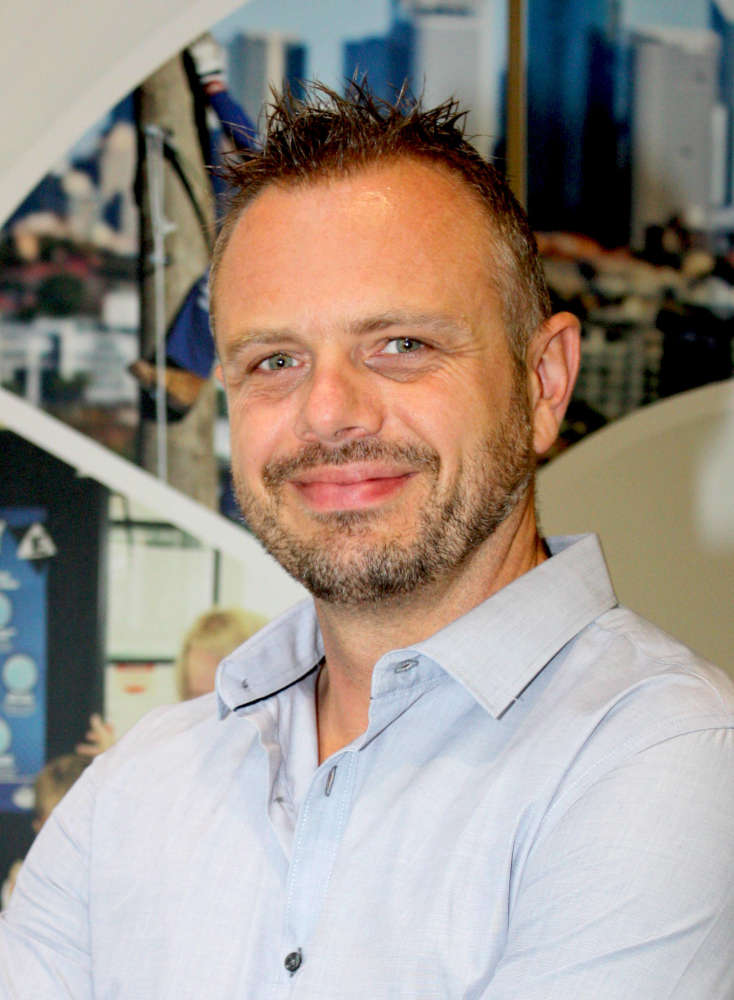
James Hill
Mental Health Manager, Energy QueenslandJames Hill is a passionate Mental Health Advocate whose background is in the electricity industry. James has successfully implemented positive systemic and cultural change regarding workplace mental health and is the Mental Health Manager for Energy Queensland, leading a dedicated mental health team. Outside the workplace James is a lived experience advisor for the Queensland Mental Health Commission and a lived experience advocate for UniSc Thompson Institute.
His achievements in the mental health sector have earned him the Individual Contribution to Mental Health Award in Queensland Australia, along with the Large Workplace Mental Health Award. In addition, he was a finalist for the Queensland Local Hero category in the Australian of the Year awards and awarded the Chancellors Medal at UniSC for his contribution to mental health.
Join us at Frontline Mental Health Conference and walk away empowered with the information you need to best support your clients, team, your peers and your community.
Who attends FMHC?
The delegates for the Frontline Mental Health Conference are varied across emergency services, defence, community, government, mental and allied health as well as business. Typically, we see:
- Emergency services personnel, defence force personnel, Police, Ambulance, Fire Services Wellbeing Officers, Managers and Leaders.
- Professors, Associate Professors, Lecturers, PhD Students from Universities around the world with a particular focus on frontline workers and emergency workers.
- Senior management and leadership roles including Commissioner, Assistant Commissioner, Unit Director & Coordinator, Member Welfare Manager
- Psychologists, GPs, Social Workers, Speech Pathology, Occupational Therapists, Physiotherapists, Nutritionists, Allied Health Manager, Mental Health Nurses working within frontline sector.
- Directors and Consultants of Private Counselling/ Psychiatrist/ Psychologist Practice.
- Mental health workers from federally funded government agencies.
- Team Lead, Program Manager, Project Lead of Hospital and Health Services and PHNs.
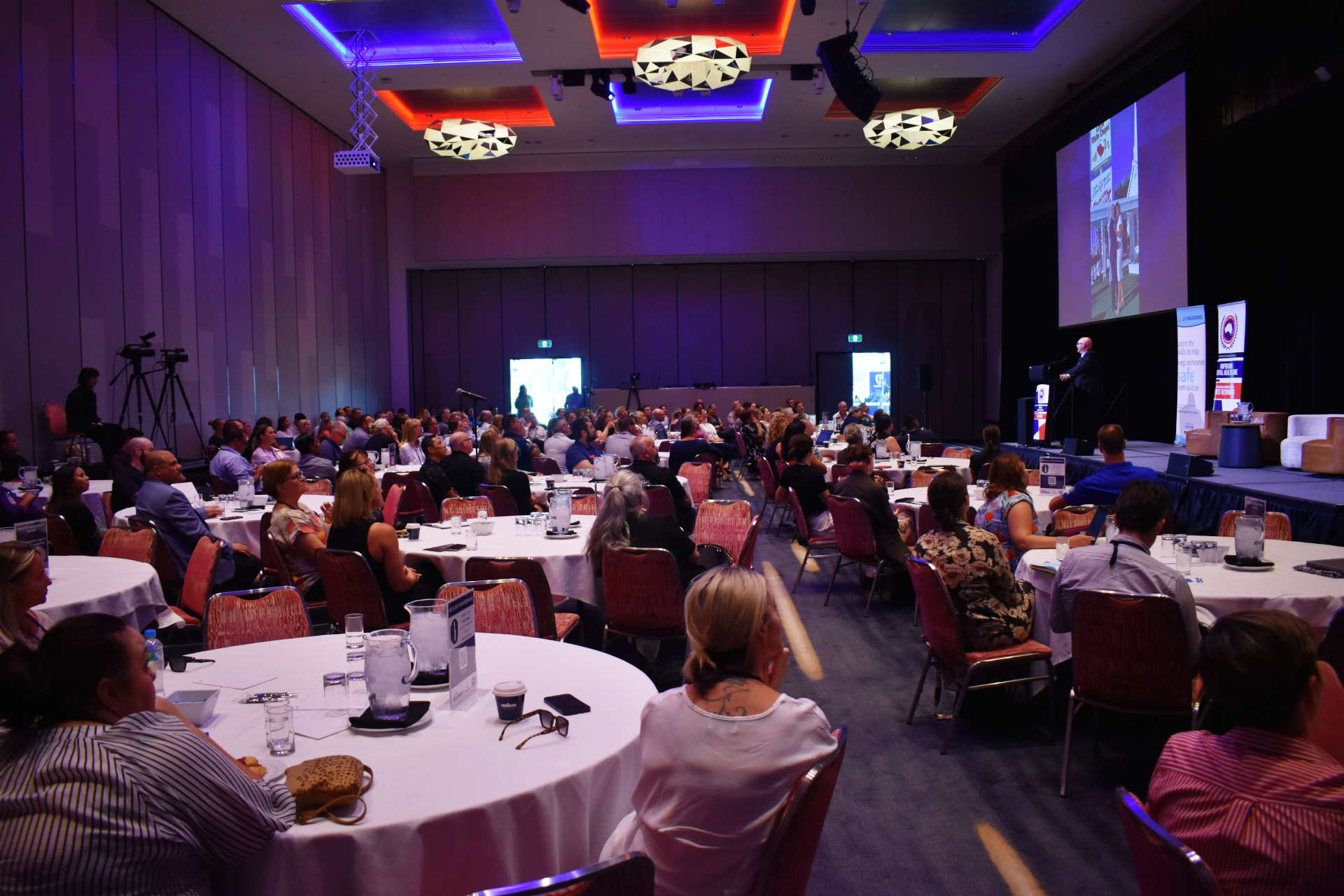
Is FMHC for me?
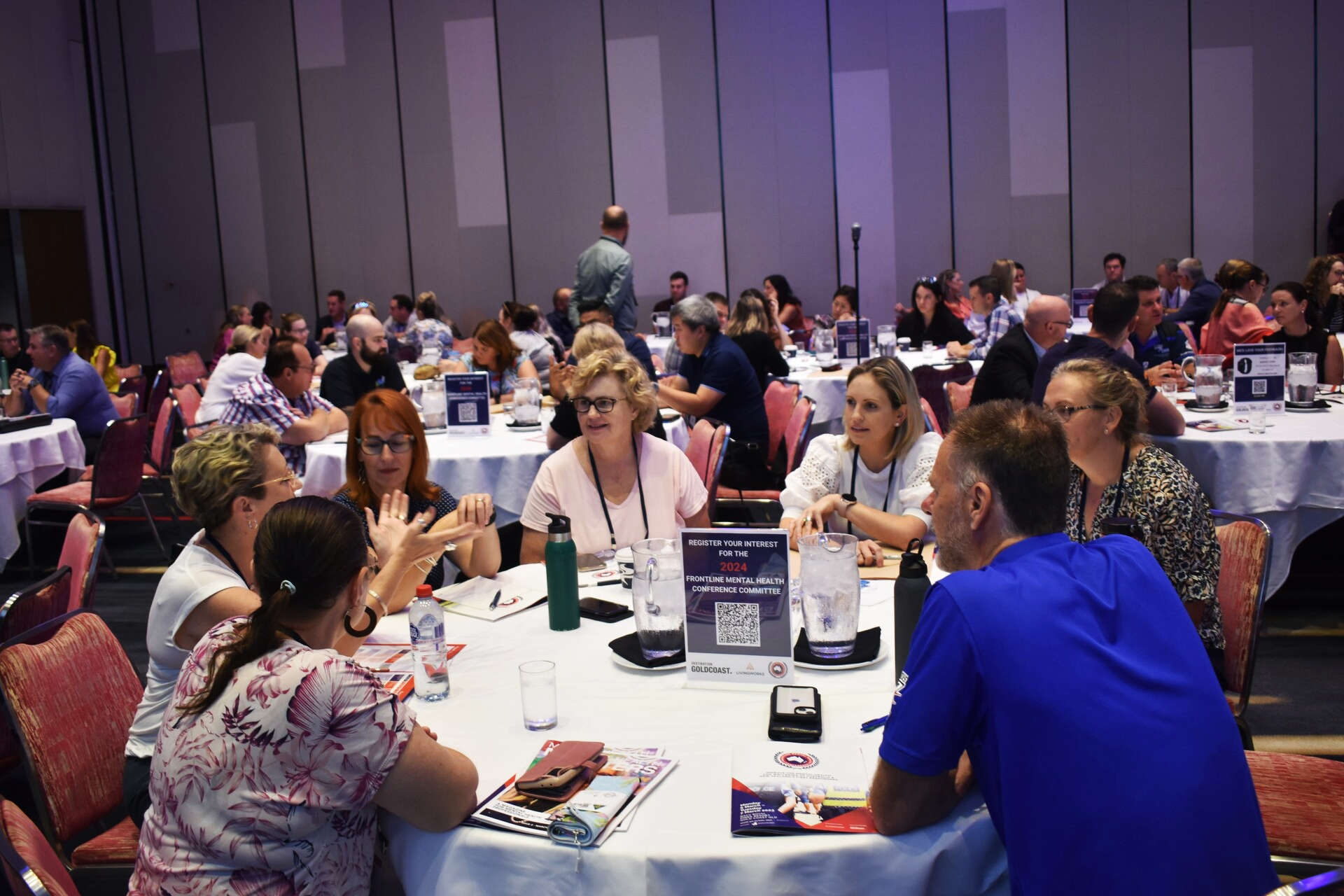
Yes! The Frontline Mental Health Conference is for you if you’re looking for:
| A space for safe, open and connected conversations around the mental health of all first responders and frontline workers at all stages of their career. | |
| Application based presentations to leave you with practical tools to create immediate and positive changes. | |
| Networking with like-minded sector professionals to discover best practice solutions. | |
| Inspiration from current research, top professionals and community leaders in the frontline sector. | |
| A platform to share your own stories, research, programs and case studies with your community. | |
| Time away from your every-day to connect with your peers and get your fingers on the information which will help you succeed in your role. |
Join us and help create a safer future for all frontline workers.
What Our Attendees Have to Say
Testimonials

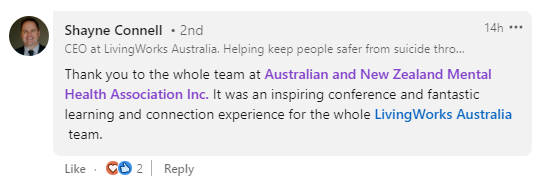
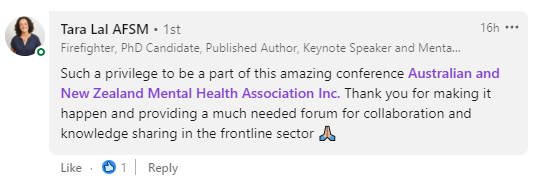




Present at FMHC
FMHC will explore the theme: “The Power of Collaboration: Working Together to Create Lasting Change”.
As a presenter you will share your latest research, findings, ideas and insights with the frontline mental health community.
This is your chance to lend your voice to the current challenges faced by the sector and provide real-world case studies, solutions and new approaches to creating safe, thriving frontline workplaces and communities.
This opportunity comes up once a year so please take this as your moment to apply to present now.
Partner with FMHC
Partner with FMHC24 and connect with 250+ frontline and emergency workers, leaders and mental health professionals.
Introduce delegates to the research, programs, services and initiatives which can help improve the mental health care and wellbeing of first responders during training, whilst serving and in post-service.
Our team can assist in creating custom partnership packages designed for your specific goals, so reach out today.
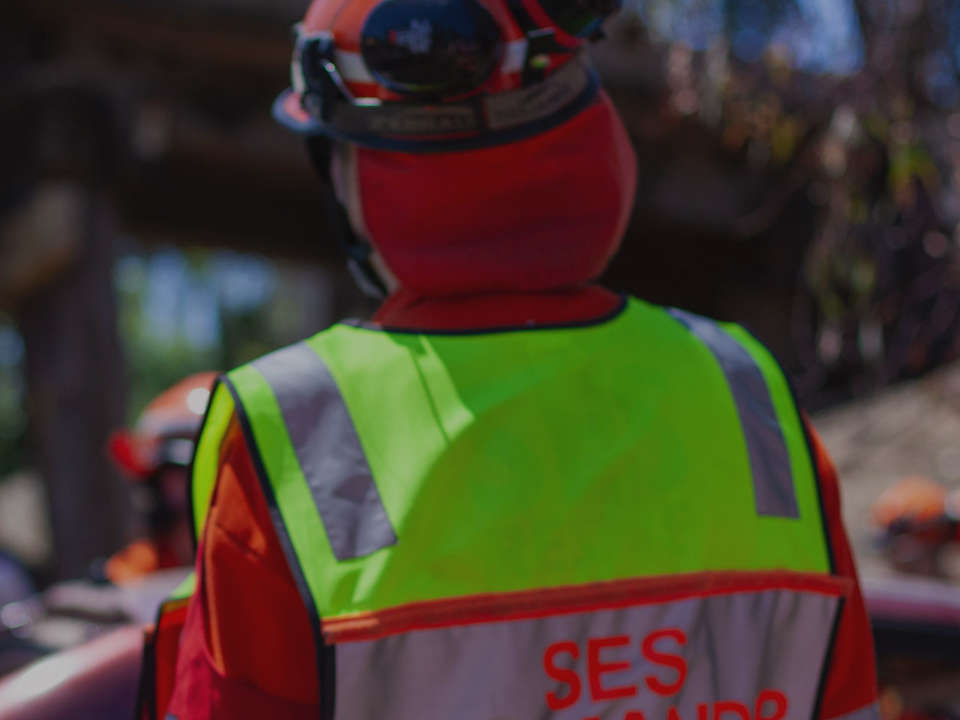
Registration Options
Virtual
2 DAY PROGRAM
$549 + GST
- Live streaming of all keynote presenters
- Live streaming of all sessions in the plenary room over three day conference period
- Virtual presentations
- Complete online access to audio and visual presentations for 30 days*
- Over 10 hours towards CPD points
- Your personalised certificate of attendance
*Access to presentation recordings (Resource Centre) will be available 5 business days after the conference and will expire 30 days. Options to extend access will also be available.
Please fill in your details below to begin your registration.
In-Person
2 DAY PROGRAM
$1,349 + GST
- All keynote presentations
- All concurrent presentations
- Discounted accommodation rates
- Access to conference app
- 5 star conference catering package
- Access to exclusive networking functions
- Complete online access to audio and visual presentations for 30 days post-event
- Printed conference materials
- Over 10 hours towards CPD points
- Your personalised certificate of attendance
- Exposure for your organisation
- Plus, chances to win great prizes!
Please fill in your details below to begin your registration.
In-Person Group (3 pax)
2 DAY PROGRAM
$3,297 + GST
- All keynote presentations
- All concurrent presentations
- Discounted accommodation rates
- Access to conference app
- 5 star conference catering package
- Access to exclusive networking functions
- Complete online access to audio and visual presentations for 30 days post-event
- Printed conference materials
- Over 10 hours towards CPD points
- Your personalised certificate of attendance
- Exposure for your organisation
- Plus, chances to win great prizes!
Please fill in your details below to begin your registration.


Venue & Accommodation
The 2024 Frontline Mental Health Conference will be held at the JW Marriott Gold Coast Resort & Spa, QLD.
Room with Breakfast for up to two people - $370
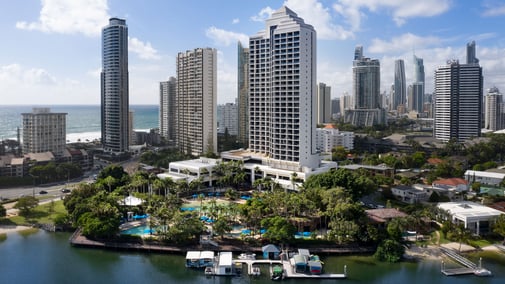

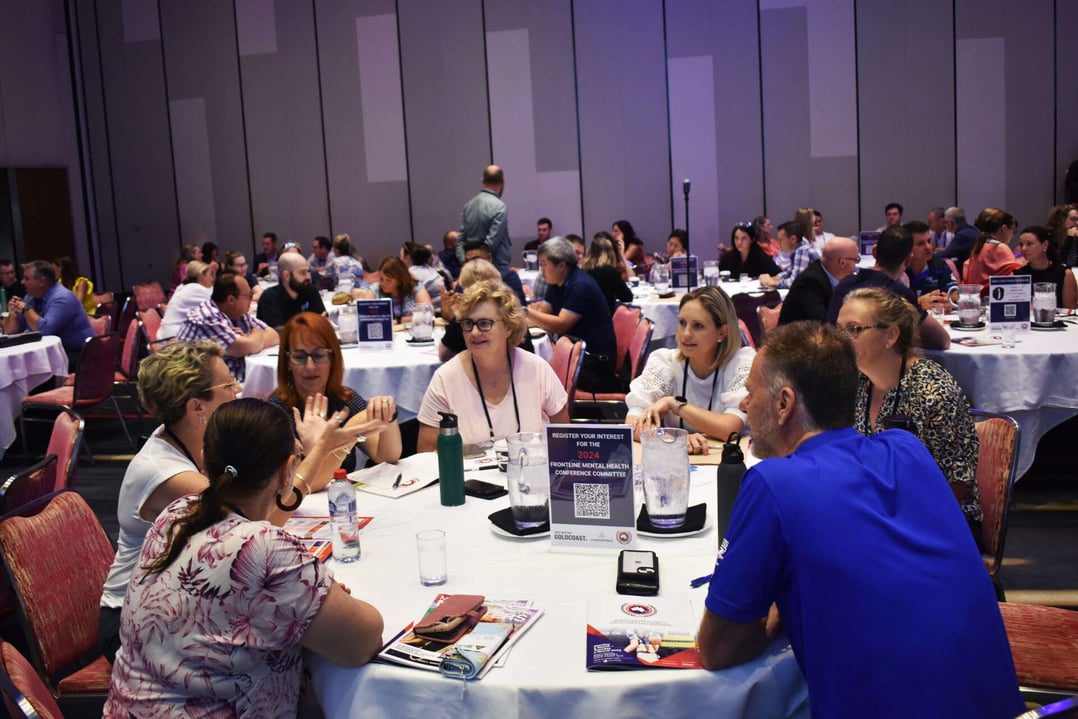
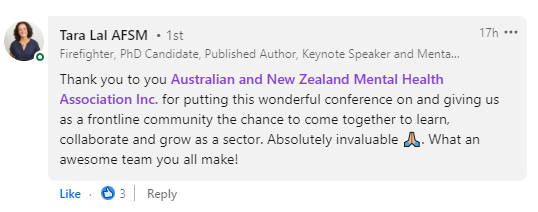





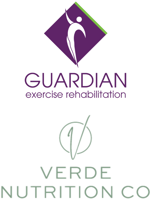
%20CMYK%20EPS.jpg?width=200&height=98&name=2010%2008%2012%20-%20WH%20Masterbrand%20logo%20vertical%20(primary)%20CMYK%20EPS.jpg)





